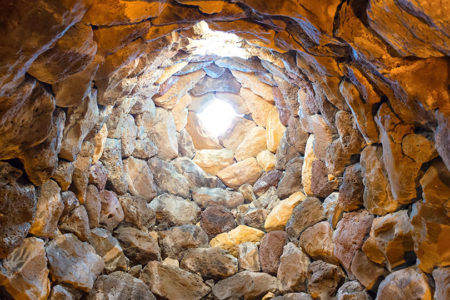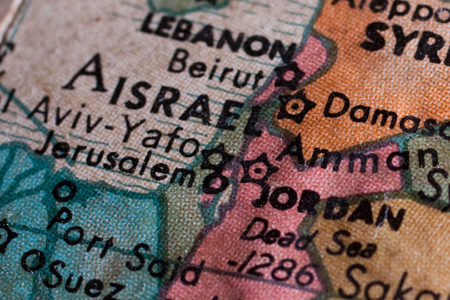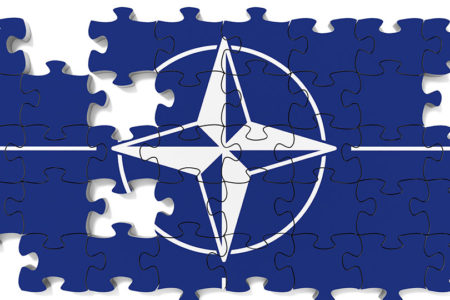Israel in the News Mar/Apr 2001
Israel may face major water crisis
Israel needs 528 billion gallons of water annually to survive. But if things stay as they are, the Jewish nation will run out of fresh water in fifteen years, according to Ronald S. Lauder, president of the Jewish National Fund (JNF).
According to a JNF advertisement in the December 18 issue of The Jerusalem Report, Israel may have only until 2015 before “there will be no more fresh water in the cities to drink or to bathe in. No more recycled water for agriculture. Industry will cease. Wildlife will die. The wells will turn sour, the lakes will be empty, the rivers and streams gone.”
The JNF wants to spend $250 million to build 100 more reservoirs that will supply 40 billion gallons of water to the people of Israel. According to the ad, Israel is running a 53-billion-gallon water deficit. It requires 528 billion gallons, but only has 475 billion gallons of fresh water. Even Lake Kinneret—the Sea of Galilee—is feeling the effects. “A few years ago, you could . . . dangle your feet in its cool, sweet water,” says the ad. “Today, you must walk 1,000 feet from the shoreline just to reach the water’s edge.”
Israel aims to put more Israeli Arabs into high-tech jobs
Motorola, Microsoft, and Net-Vision were among the participants at a conference in Herzliya designed to promote putting university-educated Arab Israelis into Israel’s high-tech industry. The industry currently employs more than 70,000 people, only 300 of which are Arab Israelis.
According to Ha’aretz, an Israeli newspaper, high unemployment among Arab-Israeli university graduates is making younger Arabs feels it’s useless to attend college. Ha’aretz reported that Mohammad Zuabi, the Jewish-Arab center’s technology coordinator, said Israel could place at least 1,000 Arabs into high-tech positions without having to train them.
Palestinians attack Israel’s chief rabbi
THE JERUSALEM POST—Israel’s Chief Rabbi Meir Lau and his driver narrowly escaped an ambush recently by Palestinian gunmen who riddled with automatic gunfire the bus the two were traveling in after dedicating a new Torah scroll at a yeshiva in the West Bank settlement of Ateret.
The bus was armor-plated, but the bullets shattered the windows and sent shrapnel and shards of glass splattering through the first row of seats. Lau and his personal driver had taken second-row seats and were not injured. The bus driver was also unhurt.
Lau said the Israel Defense Forces had asked him to leave his car at a junction and take the armored bus for safety reasons. He sat in the front seat on the way to Kinor David Yeshiva, but chose the second row for the return ride.
“It was dusk,” said Rabbi Lau. “The bus was empty, but a superior power guided me and I took the second-row seat,”.
Lebanon to jail 78 militiamen for helping Israel
Seventy-eight members of the South Lebanese Army (SLA) who helped Israel maintain stability along the border of Israel and South Lebanon have been sentenced to prison by a Lebanese military court.
According to The Associated Press, five persons received sentences of three years at hard labor, while seven were given three weeks to six months and fined $666 each for entering Israel. Many of those convicted also were fined $266.
Military verdicts cannot be appealed. Since June 2000, one month after the Israel Defense Forces (IDF) pulled out of the southern security zone known as “The Good Fence,” Lebanon has sentenced more than 1,600 people to jail terms of up to twenty years for “collaborating” with Israel.
The Associated Press has reported that at least ten former SLA militiamen have been sentenced to death (in absentia) for killing Lebanese guerrillas who were fighting the IDF in south Lebanon. The SLA once numbered 2,500. According to the Associated Press, some 2,200 fighters surrendered to Lebanese authorities or were captured after the Israeli withdrawal, while others fled to Israel with their families.
Lebanon is technically at war with Israel and forbids contact with the Jewish state.
Palestinian snipers improving their aim
THE JERUSALEM POST—Within the space of a few days, an 18-yearold settler in a moving car was shot dead from 300 meters and an Israeli soldier and officer were similarly killed by long-range fire in two separate incidents. Palestinian sharpshooters reportedly use Russian Dragonov sniper rifles, with an effective range exceeding 700 meters.
“The Palestinian snipers have improved amazingly since the beginning of the riots, and that is very disturbing,” said one Israeli official.
According to Israeli intelligence, Palestinian spies gather information on routine details like the guard-duty schedules of soldiers and travel timetables of settlers, then position their snipers accordingly.
Only special flak jackets or vests with ceramic plates can withstand sniper bullets, but these are extremely expensive and the army can only afford to provide half its personnel with this protection. Reserve soldiers are last on the priority list. A group of reservists called up recently announced that they would pay for the jackets out of their own pockets.
Jews expelled from Arab countries left $30 billion in assets
THE JERUSALEM POST—Jewish people who emigrated from Arab countries between 1922 and 1952 left behind an estimated $30 billion in assets, according to former Israeli Internal Security Minister Moshe Shahal, who chairs a world organization of Jews from Arab countries.
Shahal told a news conference in Tel Aviv that the organization was raising the issue to balance the claims of Palestinian refugees in the peace negotiations. He maintained that Jews should also be compensated for having been exiled from Arab countries, including Iraq, Syria, Lebanon, Egypt, Libya, Tunisia, Algeria, and Morocco.
Shahal said that a political settlement with the Palestinians should take into account that some 850,000 Jews once lived in these countries. Many were stripped of their assets and expelled in the aftermath of Israel’s establishment in 1948 or due to the rise of Arab nationalism in the 20th century.
In all, some 600,000 Jews emigrated from Arab countries while other Jews of Middle Eastern origin emigrated from elsewhere.
Shahal said his organization planned to submit a report about public Jewish property in Arab countries on the basis of affidavits submitted by people once involved in community affairs in those countries.
Tranquil new setting for surgery patients
THE JERUSALEM POST—Patients who travel to Jerusalem for chemotherapy or major surgery will now have an esthetic and tranquil hostel in which to recover, free of charge. The $5 million, 36-suite hostel was made possible by the Kav La’Chayim/United Lifeline voluntary organization.
The Jerusalem complex, with 30,000 square meters of space at 26 Rehov Berl Locker, offers tworoom apartments, each with a kitchen, bathroom, and balcony. It is conveniently located not far from both Shaare Zedek Hospital and Hadassah-University Hospital in Ein Kerem.
A house mother and on-site volunteers are always on hand to play with children, help them with homework, and attend to their other needs.
An 800-square-meter basement will be renovated for dining, computers, games, TV watching, study, and treatment. For all these services, the families will pay nothing.
Much of the funding comes from Dr. Evelyn Gruss Lipper and the Caroline and Joseph S. Gruss Life Monument Fund in honor of her late parents, Caroline and Joseph S. Gruss.






